I have a question about a statement from P. Wagreich's paper "Elliptic Singularities of Surfaces" (page 425):
We consider an elliptic curve $X$ and a line bundle (=invertible sheaf) $L$ on $X$.
Then, following EGA one finds that $V=Spec(\oplus_n \Gamma(X,L^{\otimes -n}))$ (it's a question of convention; often author's assign instead the scheme $Spec(\oplus_n \Gamma(X,L^{\otimes n}))$).
My first question is what does the author mean by the bundle $L \to X$?
I thought that using GAGA-principles in order to "identify" invertible sheaves with line bundles the corresponding line bundle $B_L$ to $L$ over $X$ is nothing but $Spec(\oplus_n \Gamma(X,L^{\otimes -n}))$ so $V$. See for example here
But on the other hand $V$ is introduced by the author as already the resolution of the "bundle" $B_L \to X$. This confuses me. So if $V$ is already the resolution what is the associated bundle $B_L \to X$ to $L$?
Second question: I don't understand how to verify that the graded algebra $\oplus_n \Gamma(X,L^{\otimes -n})$ is generated by $1 \in \Gamma(X,L^{-1}, \wp \in \Gamma(X,L^{-2}), \wp ' \in \Gamma(X,L^{-3})$
Hornestly, I have no idea. Does it arise from a general principle for line bundles over elliptic curves?
Remark: I have already asked the same question here: https://math.stackexchange.com/questions/3303909/generators-of-a-graded-algebra

